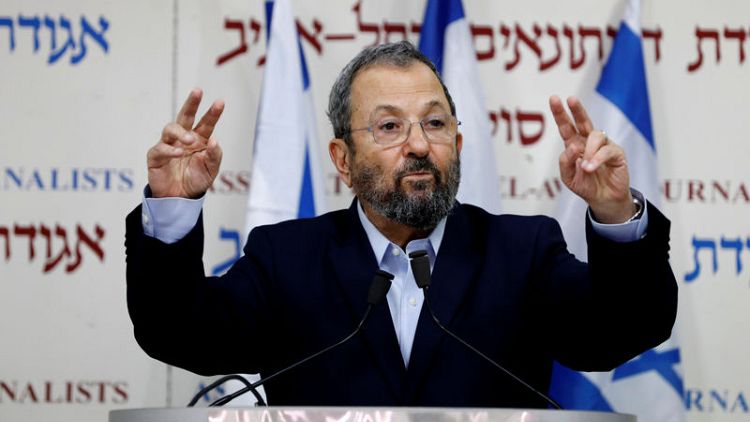By Jeffrey Heller
JERUSALEM (Reuters) - Former Prime Minister Ehud Barak on Thursday announced a joint run with a left-wing party in a September election to try to end Benjamin Netanyahu's long tenure as Israel's leader in a campaign targeting what he calls corrupt rule.
Making a political comeback at 77, Barak has been polling poorly since forming his Democratic Israel party a month ago. He has called for the creation of a strong bloc of centre-left parties to challenge Netanyahu's right-wing Likud and its allies.
"The campaign for the State of Israel began this morning. The Democratic Camp - all of us, together, will fight and win," Barak wrote on Twitter, announcing an alliance with the left-wing Meretz party and legislator Stav Shaffir, a Labour Party defector.
In office for the past decade, Netanyahu faces a pre-trial hearing in October with Israel’s attorney-general, who has announced his intention to indict him on fraud and bribery charges stemming from three corruption investigations.
Netanyahu, 69, had denied any wrongdoing. Last weekend, he became Israel's longest-serving prime minister.
Barak has said he returned to politics ahead of the parliamentary election to end what he termed Netanyahu's "corrupt leadership".
The Barak-Meretz union appeared aimed at preventing a situation in which the two small parties failed in separate runs to capture enough votes to enter parliament - a threshold of 3.25 percent of votes cast.
If they were unable separately to gain enough votes, ballots cast by thousands of left-wing supporters would go to waste, dimming prospects for a centre-left bloc strong enough to replace Netanyahu's Likud-led government.
Israelis vote for a party's list of parliamentary candidates. No one party has ever won a governing majority on its own in an Israeli election, making coalition-building paramount in forming a new administration.
Meretz won just four of parliament's 120 seats in an inconclusive April election, in which Netanyahu was unable to build a right-wing bloc of at least 61 legislators.
Blue and White, a centrist party led by Benny Gantz, a former armed force chief, is Likud's strongest opponent.
Blue and White took 35 seats, as did Likud, in the April ballot and would likely seek to add the Barak-Meretz alliance to any coalition government it might lead after the September 17 vote, rather than run jointly with it in the election campaign.
Much of the public focus on Barak in the election campaign has revolved around his ties to Jeffrey Epstein, the American financier charged with sex trafficking involving dozens of underage girls.
Barak, who quit politics in 2012, has acknowledged a business relationship with a company associated with Epstein, and told reporters he had begun moves to end it.
A former armed forces chief and Israel’s most decorated soldier, Barak was prime minister from 1999 to 2001.
(Editing by William Maclean)












